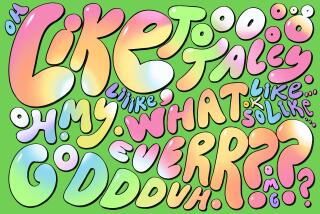Brooklynites whose accent is a stigma at the oawffice can take classes to change how they tawk.
Frank Potente thwat the way he tawked was just foyne-- until he spent some time in San Francisco.
“I would utter two words, and they would say, ‘Where in Brooklyn are you from?” he said. “The Brooklyn accent may sound cute to some people, but I don’t like it any more.”
So the 39-year-old electrician, who plans a permanent move back to California, signed up for Mary Ann Caskin’s evening course, “Lose Your Brooklyn Accent.”
Potente and the 10 other Brooklynites taking the course at Kingsborough Community College are modern-day, American counterparts of Eliza Doolittle, the Cockney flower girl of “My Fair Lady.”
No Rain in Spain
But all Prof. Henry Higgins had to wrestle with was a little rain on a Spanish plain. For a real challenge, just try teaching a native Brooklynite to pronounce “sofa” without letting an “r” creep onto the end of it.
Caskin, who teaches from the perspective of having grown up in Brooklyn, said that in her old neighborhood, the Grenada Theater was known as the “Grena-der Thea-tuh.”
The New York accent--spoken at the blurring speed of New York life in general--is a linguistic stew that combines ingredients from Yiddish, German, Italian, Irish and all the other languages that have immigrated here.
For many, the accent no longer is a proud reflection of the city’s diverse culture--it is a stigma that brings to mind rude cab drivers and tough movie gangsters. And it can get in the way of moving up the social or career ladder.
“A number of managers, presidents of companies, will send their people to me to improve their speech. For the most part, they can’t get promoted unless they improve the way they come across,” said Marilyn Rubinek, director of Executive Speech Communication, a consulting firm.
Socialite Seeks Advice
Famed speech coach Dorothy Sarnoff recalled a wealthy socialite who sought her advice on making a presentation at a big charity event. Everything else about the woman bespoke class, “but that accent was like halitosis,” Sarnoff recalled.
So Sarnoff sent the woman home with her 70-minute audio tape, “Cure for the New York Accent.” Among its exercises: holding back the lips with a pencil so that the phrase “ cwawfee at the oawffice with the bwawss “ comes out “coffee at the office with the boss.”
Sarnoff says she has sold hundreds of the tapes at $49.95 each, and claims it can purge a New York accent in two days.
Laura Darius started out helping aspiring actors correct their speech, but she quickly learned that there was a bigger market for her services in the business world. Now her Corporate Communication Skills Inc. boasts a list of clients that includes many Fortune 500 companies.
New York accent reduction accounts for a significant part of her business, and she charges up to $150 an hour for private sessions. Many of her clients, she said, are mid-level executives “who moved up through the company by dint of their knowledge and ability, and suddenly, the whole package is being judged. The first thing that pops up after dress is speech.”
Some come on their own, she said, and others are asked to by their employers.
Some Feel Intimidated
Bill Harding, a 25-year-old partner in a commercial fabric and carpet maintenance business, sought Darius out because he hopes to “knock off the New York hard sell. A lot of people are intimidated by it.”
A surprising find among the students in the Kingsborough College night class was Ataullah Mahmood, who immigrated to Brooklyn 15 years ago from Afghanistan. Mahmood explained that he finds himself speaking Brooklynese on top of his foreign accent.
He knows, he said, that “ yeah should be yes. Tellem should be tell him.”
“Basically,” he said, “I would love to speak English well.”
But not everyone agrees on the definition of proper diction. Mahmood’s classmate Paula Christiansen complained, “People are making fun of me because I am speaking correctly.”
Lapsing back into the dialect generally spoken at the downtown Brooklyn restaurant where she worked, Christiansen said: “They look at me, and they’re like, ‘Do you feel OK?’ ”


